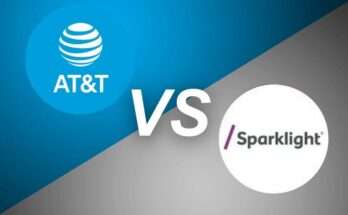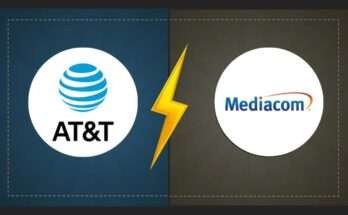In the digital world where everything is online, the right choice of internet provider is very important. While Xfinity, Frontier, and AT&T are the giants leading the sector, it is not easy to choose the one that benefits the consumer most. Gaming and streaming got a new level from Xfinity, which recently introduced the internet with zero lag. As for AT&T, its fiber cable has been further extended, promising faster connections. The frontiers remain the economic alternative but are deemed less reliable. Let us compare Xfinity, Frontier & AT&T Internet to determine which one is the best choice.
Top Internet Providers: Key Highlight
- Xfinity: Being available in most residential areas with diverse plans, Xfinity offers speed ranges of cable and fiber internet starting at 10 Gbps.
- Frontier: Provides reasonable cost and unthrottled data but suffers from reliability issues.
- AT&T: Focuses on ultra-high-speed fiber with no contracts that go up to 5 Gbps, but its service is not very widely available.
| Feature | Xfinity | Frontier | AT&T |
|---|---|---|---|
| Internet Type | Cable (mostly), Fiber (limited areas) | DSL, Fiber | Fiber, DSL |
| Starting Price | $19.99/month (introductory pricing) | $29.99/month | $55/month |
| Maximum Speed | Up to 10 Gbps (Gigabit Pro plan) | Up to 7 Gbps (Fiber plans) | Up to 5 Gbps (Fiber plans) |
| Data Cap | 1.25 TB on most plans; unlimited on Gigabit Pro | None | None |
| Contract Requirement | Optional; varies by region | Optional | None |
| Equipment Fees | $14/month for xFi Gateway (can use own equipment) | Free with most plans | Free with fiber plans |
| Availability | Extensive coverage across the U.S. | Limited fiber availability; widespread DSL | Limited fiber availability; strong presence in urban areas |
| Reliability | Reliable for cable; slower upload speeds compared to fiber | Issues with reliability and achieving advertised speeds | Highly reliable with symmetrical upload/download speeds on fiber plans |
| Best For | Budget-friendly options, wide availability | Affordable pricing for basic needs | High-speed internet with unlimited data and no contracts |
Key Features and Costs of Xfinity, Frontier, & AT&T
Xfinity Internet
Xfinity delivers cable internet services with speeds that can reach as high as 10 Gbps and as low as 150 Mbps. There is a $19.99/month starting plan, but when the offer expires, the prices rise sharply. Most plans come with a 1.25TB cap, except the Gigabit Pro, which offers unlimited access to the internet. Xfinity Internet Service connections are prevalent and reliable although the upload speeds in comparison to fiber may be lower.
Frontier Internet
Frontier DSL and fiber options are available, with a range of speed options upwards of 7Gbps. Packets are available starting from $29.99/month, making it a bargain deal. Contrary to Xfinity, Frontier Internet users have no data limits on every plan available to them. However, the speeds remain insufficient, and support services are pathetic.
AT&T Internet
AT&T is one of the best providers of fiber broadband in the country, offering high speeds of up to 5000 Mbps. Tariffs start from $55/month with unlimited and contract-free offers. AT&T fiber internet is considered very stable but can only be accessed in regions with established fiber infrastructure.
Xfinity vs Frontier vs AT&T Alternatives: Who’s Best?
These three providers, Frontier, Comcast, AT&T, and Xfinity, offer different advantages:
Reversibility of Speeds
- The fastest fiber connection offered by AT&T includes equal download and upload rates.
- Xfinity provides better maximum speed but may not match AT&T for uploads.
- Frontier offers high-speed internet but has a problem with reliability.
Cost
- Frontier has the cheapest plans in general.
- Xfinity has eye-catching introductory rates that are much higher after discounts.
- AT&T fibers are for heavy internet users as the initial cost is high but worth it.
Restrictions
- For unlimited data Frontier and AT&T will fix any configuration.
- Data is allowed up to a maximum of 1.25 TB for off-the-rack Xfinity plans and it may hinder heavy usage.
Reachability
- Xfinity has a majority presence in the country.
- There is more availability of DSL Frontier internet service than fiber optic internet service.
- The availability of AT&T fiber is yet to be wide, bit by bit more areas are being covered.
Which is better, Xfinity or Frontier, or At&T?
Well, the answer is really simple: it depends on what you wish to achieve.
- If you want a compromise between speed and stability for gaming or video playing, go for AT&T internet.
- Xfinity internet should be used when cheap deals are needed or when you are in a place where you cannot get a fiber connection.
- If you are price-conscious enough, though, go for Frontier internet as you should be able to use all the data you need with no risk of excess charges.
In specific matchups such as Frontier vs Comcast, Xfinity proves to be better than Frontier in terms of reliability, speed, and price. In an encounter where it is Xfinity vs Frontier, Xfinity’s scope of operation places it higher, such that even low pricing offered by Frontier has no effect. For those who are trying to determine between Frontier vs AT&T, AT&T is the best in terms of customer satisfaction and speed, however, the cost is higher than its competitors.
Bottom Line!
In the end, when choosing these providers, be it Xfinity vs AT&T or any other scenario, it depends on your geographic location, the price, and the volume of internet traffic you require. If you need a large coverage and flexibility on pricing, Xfinity is the right option. For the best quality of service, including fast speeds, trust AT&T. Make sure you weigh each option thoroughly before you go for any particular ISP!



